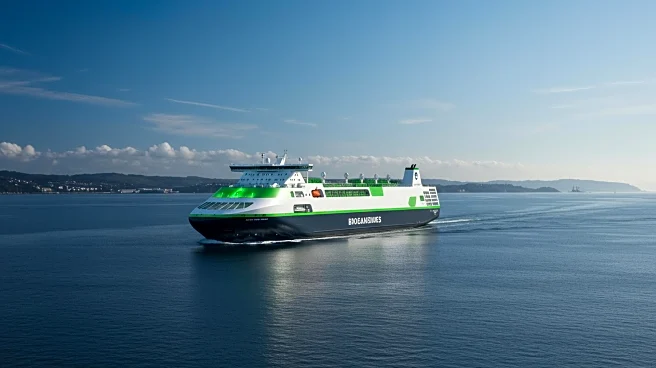What's Happening?
Finland's Wasaline is set to launch the first carbon-neutral shipping route in the Baltic Sea, ahead of its original 2030 target. This initiative is made possible through a biogas supply contract with Gasum and a FuelEU Maritime pooling agreement with Stena Line. The company's vessel, Aurora Botnia, will operate exclusively on biofuel and battery power, marking a significant step towards sustainable maritime operations. The route, running between Vaasa in Finland and Umeå in Sweden, will utilize certified biogas, significantly reducing greenhouse gas emissions. The Aurora Botnia, equipped with dual-fuel engines and a substantial battery system, will be recognized as the first international green shipping corridor in operation.
Why It's Important?
This development is a major milestone in the maritime industry’s shift towards sustainability. By achieving carbon neutrality, Wasaline sets a precedent for other shipping companies, potentially influencing industry standards and regulations. The use of biogas, a renewable fuel, not only reduces emissions but also supports waste management by utilizing biowaste and other industrial by-products. This initiative could lead to broader adoption of similar practices, reducing the maritime sector's environmental impact. Additionally, the collaboration with Stena Line enhances strategic positioning as biofuels become more critical under stringent environmental regulations.
What's Next?
The Aurora Botnia will undergo further upgrades to enhance its battery capacity by January 2026, reinforcing its carbon-neutral operations. The partnership with Stena Line and Gasum is expected to serve as a model for future collaborations in the industry. As regulations tighten, other companies may follow suit, adopting similar technologies and partnerships to meet environmental standards. The success of this initiative could prompt further investments in renewable energy sources and infrastructure within the maritime sector.
Beyond the Headlines
The move towards carbon-neutral shipping corridors highlights the growing importance of sustainable practices in global trade. It raises questions about the scalability of such initiatives and the potential economic impacts on shipping costs and logistics. The integration of renewable energy in maritime operations could also influence policy-making, encouraging governments to support green technologies through incentives or subsidies.









